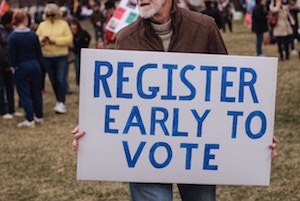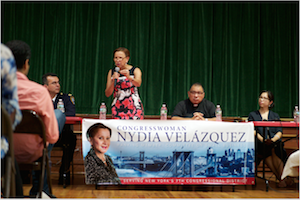Alyssa Fisher
Contributor
On a recent afternoon, one of my colleagues spent his lunch break at the DMV, looking to update his voting address. He came back later that afternoon, visibly worn out yet relieved — now he’ll have a say in the upcoming state and local election.
It was a simple announcement, about how chaotic the DMV was and how he was glad to be out of there, but it led somewhat of a heated discussion. Some shouted out their opinions, with a few questioning this move — he was last registered in a swing state.
“I live here,” he said, shrugging. “I want to be able to vote.”
Maybe because I, too, recently moved from a swing state, or maybe it’s the nature of the political climate, but I’ve overheard and been part of this argument a lot this year. Leaping over the issue of fraud, it’s a conversation worth having: Do you stay registered in your home state and district, or do you join your new local political scene?
“There are pretty good points to be made on both sides,” said Osman Chaudhary, one of several people to trickle into Starbucks off the Greenpoint G stop for clipboards, flyers, buttons and a debriefing on Julia Salazar, a democratic socialist running for senator of District 18, which covers Bushwick, Williamsburg, Greenpoint, Cypress Hills, City-Line, East New York, Bedford-Stuyvesant and Brownsville.
“I think it comes down to how excited you are about socialism,” he continued. “The most momentum right now, for socialism, seems to be in New York. If you live in New York, and you want to see that happen, it seems to make sense to me to register here.”
Chaudhary moved to Bushwick from Baltimore in June. He joined the Baltimore chapter of the Democratic Socialists of America (DSA) not too long before, so a week or so into the move, he went to a meeting for the North Brooklyn branch. He immediately updated his address and started knocking on doors. He also does data analytics for Salazar’s campaign.
“The whole platform is making sure that rent is affordable for everyone and healthcare is affordable for everyone. How can you not get behind that?” he said. “It has to happen.”
A Muslim originally from Lancaster, Pennsylvania, Chaudhary said growing up in post-9/11 culture was a “pretty weird experience.” He was involved in local politics, mostly war protesting, for years, but it fell by the wayside as he went on to earn his PH.D. in mathematics. The 2016 election prompted his return to activism.
Pennsylvania, also a swing state, put him a position similar to my own. For the first time in a few presidential elections, the state went red. Now, in his home district, there’s a socialist candidate running.
“I happen to have a choice right now,” Chaudhary said. “We have someone who seems really cool there. But just the energy here, it’s so intense. How can you not want to be a part of this?”
While he said he understands the urge to keep your home address, in anticipation of the 2020 election — whatever your political affiliation is — there’s “no good news to be gained from paying attention to the federal government.”
“This is a chance for coalitions of local and state governments to actually build something,” he explained. “We can actually get stuff done without having to even think about the federal government.”
There’s a lot to learn, and voting information isn’t easily accessible in New York. But, we’ve got you covered. There’s still time before New York’s state and local primaries, on Sept. 13.
If you need to register to vote or are currently registered outside of New York state, your deadline to do so or update your information is Aug. 19.
If you are registered in New York but not specifically District 18, you have until Aug. 24.
The general election is Nov. 6 — mark your calendars.
Most campaign canvassers will have forms to change your address (I updated mine in Maria Hernandez park), but if you haven’t stumbled upon any, you can head to the DMV or simply go online. Visit Who’s On The Ballot to register to vote or change your address. Find your poll location here.
Whatever your ideology, you have a say in what happens in your city, to you and your neighbors. Don’t tackle the ballot blind — read up on platforms.
The Republican Party unanimously nominated Marcus Molinaro, the current Dutchess County Executive, as its candidate for governor of New York; therefore, there won’t be a Republican primary. Howie Hawkins of the Green Party, Larry Sharpe of the Libertarian Party candidate and Stephanie Miner of the Serve America Movement are also running in the general election.
The Democratic primary will pit incumbent Gov. Andrew Cuomo, who is seeking a third term, against Cynthia Nixon, former Sex and the City star and democratic socialist running with the Working Families Party.
Cuomo is focused on several issues, including raising the minimum wage to $15, expanding tuition-free college, tightening gun restrictions and implementing a paid family leave policy. Nixon has been vocal about revamping the New York subway system, affordable housing, increasing education funding and legalizing marijuana.
Martin Dilan is the current New York State senator for District 18, which covers the North Brooklyn communities of Bushwick, Williamsburg, Greenpoint, Cypress Hills, City-Line, East New York, Bedford-Stuyvesant, and Brownsville. A democrat, he’s serving his eighth term and ran unopposed in the 2016 general election. He’s being challenged by newcomer Salazar.
Dilan is known to support tenant rights, public safety, voting rights and numerous transportation issues, including a ban on texting while driving. Salazar is running on a platform centered around affordable housing, criminal justice reform, passing the the New York Health Act for universal coverage, and transit improvement.
A few months, at a rally on the Upper West Side, my friend and I were approached by two women enthusiastically clutching clipboards. We were registered to vote –but in Florida, where we called home not too long before.
I remember watching my friend seize a clipboard and scribble her new address.
“I pay taxes here,” she said, before reminding me of her passion for new urbanism, among other views.
I hesitated — my swing state needed me!
I didn’t change my address that day. I didn’t change it for a few weeks, holding firm to the idea that my vote would be better spent in Florida.
I understand the dilemma. But it got me thinking: I don’t live there anymore, and I don’t plan to move back. I have few plans to visit, and I don’t trust the absentee process or my ability to remember to mail the ballot — was I going to fly home to vote? And if I did, would it be only for the presidential election, in 2020?
It’s a conversation worth having, but the way I see it, it’s important to vote where your home is.
Cover photo courtesy of Annie Bolin


